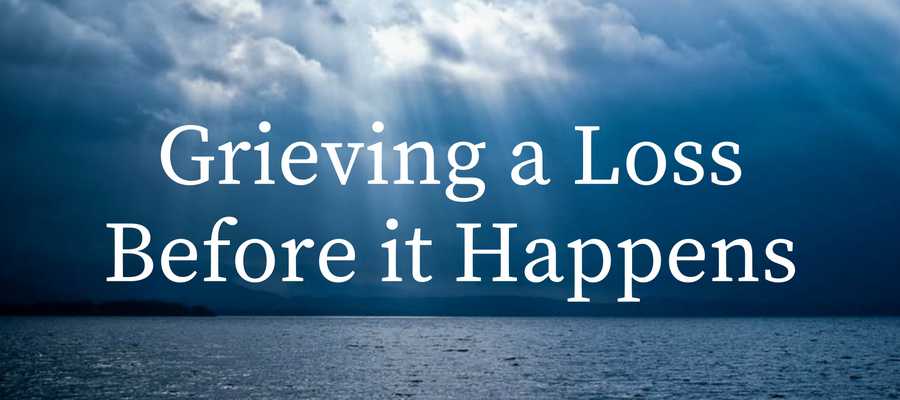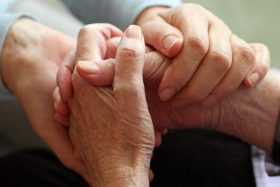
We often think of grief as something that happens after someone we love dies.
However, if a loved one is terminally ill, we may in fact go through a grieving process prior to his or her passing. This is referred to as “anticipatory grief.” We image, or ‘anticipate’ how hard it will be once he or she is gone, and how much we are going to miss him or her.
In this post on how to cope with anticipatory grief, you will find a video interview with Benjamin Allen, a husband and father whose family died because of a HIV-tainted blood transfusion. He is an inspiring speaker who has appeared on Oprah, and has written a wonderful book on surviving grief.
We also speak with grief expert Patti Allen, (no relation to Benjamin Allen), about ways to cope with anticipatory grief when a loved one is terminally ill.
Finally, be sure to read our 7 top tips for coping with anticipatory grief. It is a practical guide for getting through a difficult time.
Let’s get started…
What is Anticipatory Grief?
Anticipatory grief refers to a grief reaction that occurs before a loved one passes away, commonly because of a terminal illness. Dying persons, as well as people who love them can experience intense feelings of grief.
Talking About Anticipatory Grief With Benjamin Allen
We sat down with Benjamin Allen, an accomplished speaker on healing after loss and grief, and author of Out of the Ashes: Living in the Afterloss.
Allen shares with us the powerful lessons in grief and healing he learned after losing his wife, along with both of their sons, to HIV after she received a tainted blood transfusion during childbirth.
Allen refers to ‘anticipatory grief’ as ‘preparatory grief’ because it provides family members with time to gradually absorb the reality of the loss.
Q: Can You Share Your Personal Story With Us?
“You have overcome great personal tragedy to become a leading voice on how to survive grief and loss. Can you share with our viewers your story of losing your wife and both of your children?’” asks interview host Courtney Murdock.
“Back in 1982 at the birth of our first child, Matthew, my wife Lydia received a blood transfusion 10 hours before he was born. We did not know that there was HIV in the transfusion,” says Allen.
“We then went on to have another child about two and a half years later, my son Bryan. When Bryan was born, he was in intensive care, just like Matt was when he was born.
“A few months after Bryan’s birth, we got a call from the blood bank asking us all to get tested [for HIV]. [We were then told that] all three of them were positive, and I was negative.
“Consequently, Bryan died first in 1986 at 8.5 months old. Lydia died next in 1992 at the age of 38. And then Matthew died in 1995 at the age of 13,” explains Allen.
Q: What was Your Initial Reaction to the HIV Diagnosis?
“When you and your wife first got the call from the blood bank that she had been infused with HIV-positive blood, what was your initial reaction?” asks Murdock.
“Initially, it was shock,” says Allen.
“I can remember exactly where we were. Lydia was sitting on the couch and I handed her the phone because the blood bank had asked to speak with her. I just stood beside her while she talked to the blood bank and I saw her face go completely white.
“Both of our kids were in intensive care after they were born and Bryan had come home from the hospital with a heart monitor.
“Bryan was only around 5 months old when we got the call. We had no idea what was going on with their health as Lydia and both boys had been experiencing health issues.
“When we got the call, it was absolute shock and we really went into moment-by-moment living from then on,” explains Allen.
Q: How Did You Manage From Day-to-Day?
“How did you cope with the realization came that you and your wife would not have the opportunity to growing old together, and that your children would not reach adulthood?
“And how did you manage to get on with everyday life when you knew what would eventually happen?” asks Murdock.
“Life became really focused on living in the moment,” answers Allen.
“What do we need to do next? All of those existential questions like, ‘what is life about?’ and the meaning of life and death, and what was important to us. We really had to work through this in the midst of the shock that this revelation brought.
“And we needed to work through all the emotions we were experiencing while also taking care of our children and making sure that their emotions and needs were cared for.
“So we decided very early on that we were going to live in quality rather than quantity. It wasn’t about how long we had together, but how we spent that time. The quality of life was what was important,” says Allen.
Q: How Did You Prepare Your Children for Death?
“In your book you said that most parents have to teach their children how to live, but you had to teach your children how to die. How did you accomplish such a heartbreaking task?” asks Murdock.
“Well, there were two different ways that I did this because the circumstances were very different between Bryan and Matt,” explains Allen.
“Bryan was an infant for his entire life. He only lived to 8.5 months old. He could never crawl or hold his head up on his own. I would just hold him and sing to him. He was in so much pain for the last few months of his life, and he would just scratch at my chest and cry.
“So I would just hold him, and rock him and sing to him and I would picture this incredible love and focus on wrapping him in this love. My goal was that when he did die, I wanted him to be able to say: ‘Yes, I know this love.’
“With Matt, the circumstances were very different. Matt lived through his brother’s death, his mother’s death, and coming to terms with his own death.
“Matt was almost 3 [years old] when we first learned about the HIV diagnosis. So we really tried to make death a natural part of life. When we talked about death, and talked about Bryan’s death, we really tried to make it as this is just what life is about.
“It took a lot of intentionality and a lot of awareness in order to make it not scary, but a natural part of life.
“When Lydia died, we talked a lot about her death. And Lydia and I had tried to prepare him as best we could.
“We also had to prepare him for his own death, so we encouraged him to talk to us about his fears. I made it a part of life and a part of the whole journey.
“We really focused on addressing everything with genuineness, honesty and openness in order to make sure that we gave him the space to feel what he needed to feel and know that the pain and the hurt that he was carrying was okay. We made sure to not hold anything back.
“Matt was actually my biggest teacher in this. He always addressed everything upfront and never left it up to guessing or drawing his own conclusions.
“It was so important that Matt felt that he had the space to come to us with whatever he was experiencing and that we would address it with unconditional love,” explains Allen.
Q: Is Anticipatory Grief Different to Post-Death Grief?
“Was the grief that you felt when anticipating the death of your wife and sons different to the grief that you felt after their actually passing?” asks Murdock.
“Very much so,” responds Allen. “Preparatory grief can only prepare you for so much. We had 13 years of it with Matt, 10 years with Lydia, and only a few months with Bryan.
“Even having those experiences of the death of both Bryan and Lydia, Matt’s passing was different. Just like every life is different, so is every death. And so one person’s death does not necessarily prepare you for another.
“The preparatory grief for each was different and unique, just like grief in the ‘afterloss’ is different and unique.
“Each person really goes through their own journey through grief and how they do that really has to be tailored their what is authentic to them. There is no cookie cutter way of experiencing grief in either preparatory or ‘afterloss’ grief,” states Allen.
Q: How Can Grief Strain a Marriage?
“The loss of a child can put a serious strain on a marriage when one or both partners close down emotionally. After the loss of your son, Bryan, at 8.5 months of age, how did you and your wife manage to support each other through the grief?” asks Murdock.
“It was up and down,” says Allen. We both did the best that we could. It is very true that a lot of relationships end after a loss.
“In my understanding and personal experience, it is because in loss and grief there is a uniqueness in experiencing it that everyone moves through alone. But we aren’t alone. There’s this paradox and unique isolation that comes with grief that is universal and collective.
“In Lydia’s unique experience with loss, she was not only grieving the loss of her son, but also that she was going to lose her own life and that Matt was also going to die. And as we were going through this, she knew that she was going to die before Matt.”
“So she was not only grieving the loss of her child and struggling to accept her own death, but she also knew that she was not going to be able to be there for her other child who was going to die the same painful way that she was dying.
“The massiveness of that fact, combined with how personalities come into play in a normal relationship, intensified things. So we did the best we could and bounced in and out of intimacy.
“In the end, we came to a really great place of connectedness and love. It’s easy to think that couples would come together and be closer, but that is not necessarily the case. It ultimately was with us, but it is not easy,” says Allen.
Q: How Did You Help Your Son Accept Death?
“After Bryan passed away, your wife Lydia also passed, and you were left to raise your son Matt alone. How did you help Matt process the loss of both his brother and mother, and accept his own upcoming death?” asks Murdock.
“I focused on emphasizing these losses as a part of life,” explains Allen.
“I continued to parent Matt as Lydia and I had always parented him. All of her wisdom and her insights carried through as I walked with Matt through this part of his life. Lydia always said that she would be there when Matt died, and that I would be passing Matt over to her.
“We told this to Matt on a daily basis. We would read a book to Matt every night, all of his life. After Lydia died, I would still read him a book every night.
“Afterwards, he would put on a tape of whale sounds that he loved to sleep to and I would walk out of the room. I would wait at the door for a few minutes and that is when I would hear him cry. I would them come back in and lay down with him and not say a word.
“I just let him cry, and then I would ask him ‘what are you feeling?’ or ‘what are you thinking?’ I didn’t know if he was crying for Bryan, or for his mom, or for his own death, and I didn’t want to put those things out there.
“That is an example of how I held the space for him to feel what he needed to feel. I didn’t try to direct his emotions. I just tried to be present for his emotions and what he needed to go through,” explains Allen.
Q: After Losing Your Whole Family, How Did You Survive the ‘Afterloss’?
“After losing Matt, the last member of your family, how did you learn to live in the ‘afterloss’?” asks Murdock.
“The reason I use the word ‘afterloss’ is because we talk about people who die going into the ‘after life,’” explains Allen.
“But there was no ‘before’ life for me anymore. I couldn’t go back to that. So I was experiencing a new relationship with life. I am living in the ‘afterloss’. It is not grief as much as it is a shift in perspective. There is a new relationship with myself, with the ones that I love, and a new relationship with the world.
“I really had nothing left after they died and I was absolutely worn out emotionally. I decided that I was just going to follow loss, wherever grief took me. I was going to lean into it and let it take me wherever I needed to go.
“That was the only thing that kept me alive. And that’s where I started to find these different landscapes of the ‘afterloss’.
“That is what I have articulated in the book—and in how I have come through—in the hopes that I can help someone in their own ‘afterloss’ and how to make it through,” says Allen.
Q: What is Your Best Advice for People in Deep Grief?
“For viewers out there who are hurting desperately and wondering, ‘How can I keep living,’ what is your best advice for them?” asks Murdock.
“My best advice is to keep on loving,” advises Allen.
“That love that I have for Lydia, Bryan and Matt has never shifted, never altered, and never faded. It was that love that they had given me that helped me inch my way through.
“When someone comes into that experience of loss, it is like walking into a dark room and having to let your eyes adjust before you make a move. I had to really allow myself to take it day by day, make small moves, and be gentle with myself.
“It is also important to realize the depletion element. It is incredibly difficult to live in that loss, so being gentle to yourself is incredibly important,” explains Allen.
Q: What Life Lessons Have You Learned?
“What have been the biggest life lessons that you have learned during your journey?” asks Murdock.
“If I had to pick one, I would say to be in the moment is the most important lesson I’ve learned,” says Allen.
“Being in the moment and knowing that that moment has a past, present and future. Understanding that they are a part of me.
“When someone dies that I am really close to, a part of me goes with them, and a part of them stays with me. [Grief reintegrates] into a new way of relating to life—within myself, with the person that I lost, and with the world around me.
“With this reintegration, I am constantly unfolding within myself the things that I got to keep of theirs—their love, compassion and wisdom. Those experiences have been integrated into my life.
“But, there is a part of me that is not here and has gone into the expanse. Living in that balance and harmony with the expanse, with the infinite and the finite, has been the greatest life lesson. I’m not all here and I’m not all there.
“Grief and loss are never over. It changes and becomes different. My loss has become more of love.
“I still miss Bryan, Lydia and Matt on a daily basis, and still think of them often. But, I think of them now in gratitude, and in love, and in connection, rather than in that initial loss of disconnection and feeling the emptiness,” explains Allen.
Talking About Anticipatory Grief With Patti Allen
We sat down with experienced grief and bereavement educator, Patti Allen, to discuss coping with anticipatory grief.
Q: What is ‘Anticipatory Grief’?
“The first question that I have for you is, what is anticipatory grief?” asks interview host Courtney Murdock.
“Anticipatory grief is the grief that occurs before a loss, generally when one gets the news that a death is likely or imminent,” explains Allen.
Q: What Emotions Might You Experience With Anticipatory Grief?
“What kinds of emotions might someone experience when experiencing anticipatory grief?” asks Murdock.
“They are pretty similar to actual grief. There can be sadness, anger, isolation—a lot of [those kinds of emotions],” explains Allen.
“I guess where it differs is that with anticipatory grief there is a lot more wondering what it will be like and [imagining]. That can produce anxiety, fear, and sometimes depression.”
“You touched nicely on my next question which is how anticipatory grief differs from grief following the loss of a loved one, so I’m going to move on to my next question,” says Murdock.
Q: Can Anticipatory Grief Be Addressed Before a Terminally Ill Person Passes Away?
“Can people address their anticipatory grief before their loved one has passed away? Are there ways to prepare for an impending loss?
“Absolutely, for sure. For those who like to write, journaling is very helpful,” says Allen.
“Also get your support in place. The upside, (if we can call it that), of knowing you’re going to lose a loved one is that it does give you time to work on it and get affairs in order.
“You can express what needs to be expressed and really finish up anything that was unfinished during the life. This can include forgiveness, but not everyone is ready to do that.
“So you can imagine that you go the whole gamut of what people might do, depending on the situation.
“But, I would say to start there and really start working on visualizing what the future going to look like for you without that person in your life. It’s hard work. It is really hard work, but it helps in the long run.”
“Absolutely,” affirms Murdock.
Q: Can Working Through Anticipatory Grief Result in Premature Detachment From a Terminally Ill Person?
“Is there any danger that working through anticipatory grief will result in premature detachment from the dying person, perhaps as a coping mechanism?” asks Murdock.
“You know, some people do that. It’s not a large danger because when you look at grief, it is so different for each of us,” explains Allen.
“Very true,” affirms Murdock.
“And you know the textbooks love to have guidelines,” says Allen.
“Yes. A ‘definition’,” says Murdock.
“Yes, a definition, and a timeline,” affirms Allen. “You should be here by 6 months, and then you’re okay. It doesn’t work that way with grief. So much of a person’s reaction to it is going to depend on what type of person they are and what grief they’ve already experienced.
“If you’re 35 [years old] and your grandparent is dying, … if this is your first loss, it’s going to be really intense. [You won’t be] thinking: ‘You know, they’re old, of course I know my grandparents will die.’
“Other people have had a lot of traumas around loss. And I’ll just mention that I include in the general definition of loss everything from divorce, job loss, moving, huge dramatic life changes,” explains Allen.
“Right, big life transitions,” responds Murdock.
“Yes, so the way that a person reacts will be dependent on that. Some people do detach, and sometimes it’s the dying person that detaches …. they don’t want to stress their family members out more than they already [have], so they back off,” explains Allen.
“Other times, the living become even more attached to the dying person, not just detached. So we have the full range of reactions [with anticipatory grief].
“But there is no greater danger of [prematurely detaching] than with anything else,” concludes Allen.
Q: If You Avoid Dealing with Anticipatory Grief Prior to a Loss, Does This Impact Post-Loss Grieving?
“If a person doesn’t deal with their anticipatory grief prior to a loved one’s death, what affect, if any, does this have on the post-loss grieving process? For example, can it lead to complicated grief, by which we mean intense grief that doesn’t resolve within 6 months and impacts normal, day-to-day living?” asks Murdock.
“I don’t believe that anticipatory grief really impacts [post-loss grieving] just by being anticipatory,” says Allen.
“So what that may look like for some people, and for me as someone who works with people’s emotions all the time, I see that if you are avoiding the feelings that are coming up, you may be anticipating all sorts of things, getting depressed and anxious, and so on.
“And if you avoid it before the death, you are likely to avoid it after. The only exception is that some people try to protect their family members … they can actually deal with their emotions once the person is gone.
“But [anticipatory grief] doesn’t, in my experience anyway, make ‘complicated grief’ more complicated.
“The real question is, are you willing to look at your feelings? … The basic tasks of mourning [are] accepting the loss, learning how to live with it, and even moving on or creating new attachments with other people in your life. We have to do that anyway.
“So again, if we go back to what I mentioned before, how a person has experienced loss prior to this [loss], and their own emotional way of behaving in the world, [impacts their grieving process].
“You know, some families teach: ‘Oh, we don’t talk about these things.’ And other families will teach … ‘You shouldn’t cry! Boys don’t cry, right?’
“So there are all kinds of family beliefs that are going to colour how a person deals with [grief]. But that is going to follow them no matter where they are, so we might say that anticipatory grief is a great gift.
“… In addition to having time to put your affairs in order and to say goodbye, which doesn’t happen with sudden death, you really have the chance to grow emotionally. Not everyone will be happy about that,” notes Allen.
Q: What is Your Best Advice for People Facing the Imminent Loss of a Loved One?
“What is your best advice for people who are facing the imminent loss of a loved one?” asks Murdock.
“For sure, [try to] continue on with your own life as best you can. It will be more complicated if you are the caretaker for the person who [is dying], but it is a really good time to put some self-care practices into place.
“Taking time for yourself to just breathe. You don’t even realize sometimes how tense you are until you just pause. But making [deep] breathing a regular habit can really do a lot.
“We really can’t underestimate the power of stress to mess our own health up and there is nothing more stressful than this. So putting that into place is important.
“A lot of the things we can do, people might do for you afterwards too. People might say, ‘Can I bring a casserole over?” or something like that. Say yes!
“You know if someone wants to help you, [for example], ‘Can I stay with your Mom for an hour while you go get your hair done or run some errands?’… be willing to accept help. And not everyone can [accept help], so that is actually a pretty big one too.
“The task of mourning though is never finished … grief can go on forever.
“You know, if you’ve had a major loss, you know you don’t stop loving that person and you don’t stop thinking about them. But [the feelings of grief] comes in waves, and how you handle it over time [changes, and] is not so much of a tsunami as it would be right when it’s all very new.
“So just continuing to accept the fact that it’s a never ending process and giving yourself permission to feel,” concludes Allen.
“Great advice,” says Murdock.
Q: How Can We Support Someone Experiencing Anticipatory Grief?
“Lastly, how can we support a friend or family member experiencing anticipatory grief? Is there anything we should avoid doing or saying when offering support? You mentioned [bringing] casseroles [and visiting]. What else can we do to give support?” asks Murdock
“First and foremost, most people don’t actually think anticipatory grief is a thing. Not so much professionals, but the average person on the street. ‘How can you mourn something that hasn’t happened yet?’
“Not only do we imagine and mourn what might be, but we are also mourning the loss of our hopes and dreams, or all the potential, especially with a younger life, of what could have been.
“So accepting the fact that [anticipatory grief] is real is a great way to help someone that is going through it.
“Of course, the practical things too. Shop for them, run errands for them, give them a little respite from caretaking and so on.
“But the most important thing is to listen without judgment. If your friend wants to open up to you and share, or they do it because it explodes and they have no choice, don’t say, ‘There, there, I know how you feel’ because you don’t know how the person feels.
“Whether you have had a loss or not, you still don’t know what it feels like to be that person experiencing a loss.
“So really becoming a good listener and doing it without judgment is the greatest gift that a friend or family member can give,” says Allen.
“That was lovely. Very well put!” concludes Murdock.

7 Top Tips for Coping with Anticipatory Grief
1. Accept that Anticipatory Grief is Real
It is normal to feel grief when a loved one is terminally ill. Ignore well-meaning people who make comments like: “You’ll only truly grieve once they are gone.”
Anticipatory grief is real. And while anticipatory grief has features similar to post-loss grief (e.g. sadness, depression, anger), anticipatory grief is not a case of starting the “real” grieving process early.
2. Acknowledge Your Loss
Well-meaning acquaintances may try and make you feel better by making comments like: “At least your Mom is still here” or “You’re blessed to have this time together.”
No matter how well-meaning these types of comments might be, it minimizes the pain that follows a terminal illness diagnosis.
Give yourself permission to grieve for the future that you will not have with your loved one, for the loss of your hopes and dreams. No emotion is “wrong.”
Consider seeking support from a qualified therapist, a chaplain, or a bereavement support group. You may also find creative outlets helpful for processing difficult emotions, like journaling, painting, scrap-booking, or letter writing.
3. Don’t Feel Guilty About Anticipatory Grief
Grieving while your loved one is still alive does not mean that you have given up on him or her. Accepting that he or she will eventually pass away does not mean that you do not care about him or her.
There comes a time when the medical diagnosis is that your loved one has no hope of recovery from the illness. It’s okay to shift your focus from hoping for recovery to planning to spend meaningful time together and making sure your loved one is as physically comfortable as possible.
You do not need to feel guilty about grieving the imminent loss. As long as you are continuing to provide support to your loved one, you haven’t given up on him or her.
4. Plan to Spend Meaningful Time Together
As Benjamin Allen stated: “We decided very early on that we were going to live in quality rather than quantity. It wasn’t about how long we had together, but how we spent that time.”
Try and plan time with your loved one that is meaningful to you both. Talk about special times you had together, things that you are sorry about, and about how much he or she will be missed. Don’t be afraid of crying together.
If your loved one is in the last stage of the illness and is unconscious, you can still communicate your love through physical touch, like holding her hand or stroking her hair.
If your loved one is open to it, discuss his or her wishes for the funeral service and burial. However, if he or she finds it too upsetting, don’t persist with the discussion. (Again, we have a highly practical post on how to have this difficult conversation.)
5. Take Care of Yourself
As Patti Allen explained, it is vital to take care of yourself during this difficult time.
It is natural to want to direct all your time and energy on caring for a terminally ill loved one, but failing to take at least a little time for yourself will lead to emotional and physical exhaustion. There is an old adage that you need to take care of yourself so that you have the strength to take care of others.
Check out our post that includes a guide for caregivers on how to take care of you.
6. Ask For Support
When dealing with anticipatory grief, as well as managing the day-to-day care of a terminally ill loved one, do not be afraid to ask for emotional and practical support. After all, it takes a village…
When it comes to dealing with feelings that arise from anticipatory grief, which can be overwhelming, talk to friends and family that will listen to you without judgment. You can also talk to a minister or clergy, a professional therapist, or join a support group.
You will also need practical help during this difficult time. As examples, ask friends to sit with your loved one for a little while so that you can take a break. Ask them to do grocery shopping, prepare meals, or help with child-care if you have children.
For more ideas, check out our post on ways family and friends can help you. Most times people love to give assistance, so you only need ask.
7. Understand that Relief After a Loss is Normal
When a loved one has a serious illness, you can be a caregiver for months or even years. It can be physically and emotionally exhausting work. Anticipatory grief can also arise during this difficult time.
When your loved one passes away, you may feel a sense of relief that his or her suffering over. This sense of relief does not mean that you didn’t love the person. It is a normal reaction after a stressful and overwhelming time in your life.
It is also important to know that you will also grieve after the loss. Anticipatory grief does not prevent, speed up, or slow down the grief that you feel after the death.
Furthermore, we all grieve differently. Our grieving process is shaped by our personality, our previous experiences of trauma, family dynamics, and the nature of our relationship with the person that passed away.
Read our posts on what it means to grieve and on the five stages of grief for more information on the healing journey.
We’d Love to Hear From You
We appreciate the time Benjamin Allen and Patti Allen took to speak with us and for sharing their experience and expertise. If you found this post on anticipatory grief helpful, we would appreciate a Facebook Like.
We look forward to reading any feedback or questions that you may have in the comments section below.
Please know that you are not alone. Love Lives On is committed to providing you with resources and tools to help you in your time of grief. We are truly sorry that you are going through a difficult time.
To find a grief professional or support group in your local area, search our vendor directory.
You can also follow our Pinterest board for more resources for coping with anticipatory grief.







